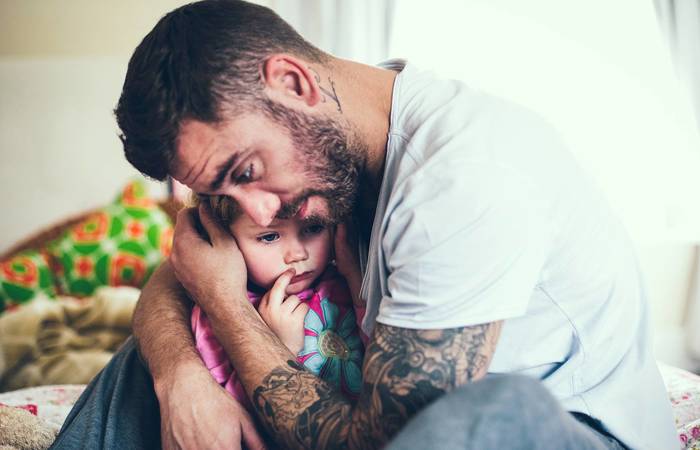Like what you see?
Sign up to receive more free parenting advice.
Thank you for subscribing to our newsletter!
Child Development

Credit: iStock.com/fizkes
Feeling disappointment is a normal part of life.
Children, parents and carers, grandparents - we all feel let down or disappointed sometimes.
But in the midst of a pandemic, disappointment is a lot more prevalent in our children’s lives than usual.
Family trips are being postponed, birthdays or other celebrations are being disrupted and relatives are being missed.
As adults this can be hard enough to handle, so how do we help the youngest members of our families work through disappointments in a constructive way?
University of Queensland Occupational Therapy Lecturer Dr Cathy McBryde says in this current world of more frequent disappointments and changes to plans, a good strategy to help your children stay emotionally strong is your time and attention.
“There is a lot of disappointment around at the moment and that can be so tricky, but one of the key things that can help your children build good self-regulation and the ability to manage their emotions is a loving, safe and secure environment,” she says.
“So, putting away your phone and your work and really quarantining that time to have one-on-one interactions that are led by your child and what they like to do, can help them to learn to take risks, get reassurance and build their confidence.”
Learning to name emotions and forewarning
Raising Children Network Director Derek McCormack says we can’t, nor should we remove disappointment or adversity from our children’s lives, but there are things we can do to help them deal with disappointments and build their resilience, especially during a pandemic.
“One thing we can do is to help our children develop problem solving skills around disappointment,” he says.
“This can start by helping your child recognise and give names to those emotions they might feel, like disappointment, or sadness.”
Communication and forewarning are also important to help your children understand that plans might change.
Setting a child’s expectations early so they know what to expect, can go a long way to helping them manage their emotions and bounce back when something they have been looking forward to has to be changed, postponed or cancelled.
Some concrete examples might include letting your child know that a potential lockdown is looming and it could interfere with an upcoming birthday party or another event.
Or if you suspect an interstate visit with Grandma and Grandpa will need to be postponed, forewarning your children can help them process and prepare for a change of plans.
“Talking about potential problems, or changes to plans gives parents the opportunity to give names to feelings like disappointment or sadness and this kind of conversation can be a really good insurance policy for what we call emotional regulation,” Mr McCormack says.
“Your child then learns that ‘I’m able to talk about my feelings as they occur,’ and also ‘I have names for them,’ so when you’re looking ahead at possible changes to plans then you can be somewhat prepared.”
Helping your child build resilience
So how do you help your children build their own resilience to potential disappointments when you as the parent are also feeling let down by sudden changes to your plans?
According to Mr McCormack, seeing the way you react to disappointing changes is a great way for children to learn to manage their own emotions, so it is important to avoid masking your disappointing.
“When you are teaching something like resilience, which is a little more abstract, often it is done through role modelling, so explaining to your child how you are feeling and letting them see you name your emotions, is certainly a good way to start helping them to build their resilience over time.”
“It provides you with a good opportunity to talk to your child about what it feels like to be disappointed and how you are feeling in that moment, while staying emotionally stable,” he says.
When you are teaching something like resilience, which is a little more abstract, often it is done through role modelling, so explaining to your child how you are feeling and letting them see you name your emotions, is certainly a good way to start helping them to build their resilience over time.Derek McCormack
Stay up to date with the latest news and articles from First Five Years
Thank you for subscribing to our newsletter!
Managing emotions takes practice
A person’s ability to manage their emotions when they’re facing a difficult time comes down to resilience, says Mr McCormack.
“Having resilience as part of a child’s make up does help with coming back or finding their way back to stability after a difficult time,” he says.
"But one thing we have looked at when we were researching resilience is that resilience is not something a child does or does not have, it is not black and white. The truth is, resilience can increase or decrease during a person’s life and it can be stronger at some times and less so in others.”
Children, like adults can have different levels of sensitivity around changes to plans and most parents will already have a feel for how their own children might react to changes in circumstances, especially at times when they are facing more adversity, like during a pandemic.
But like all things, the more you and your children practice managing your emotions during difficult times, the better equipped you will be when faced with adversity or disappointment and the more resilient they will be.
“You might find during certain times, like right now, we might be focusing more on building our child’s resilience, or checking in more on how they’re going, but during other times resilience isn’t as much as a focus because it’s simply sitting in the background ready for the next challenge,” says Mr McCormack.
Practical tips to help your children manage disappointment:
1. Help your child to problem solve on a day-to-day basis.
Find opportunities for children to build their own ability to problem solve, with your support if they need it.
For example, during a lockdown you could help your child adapt to that situation and support them to work out for themselves how they can engage themselves for set periods of time.
2. Praise and encourage your child often.
Remembering to praise and encourage your child can really help build their emotional resilience to safeguard against disappointment.
Praise like: “I really appreciate the effort that you’re making with this,” can go a long way to helping a child stay robust.
3. Provide them with lots of positive attention and interaction.






